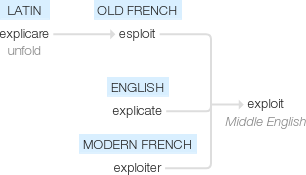Exploit
Middle English: from Old French esploit (noun), based on Latin explicare ‘unfold’ (see explicate). The early notion of ‘success, progress’ gave rise to the sense ‘attempt to capture’, ‘military expedition’, hence the current sense of the noun. Verb senses (mid 19th century) are from modern French exploiter .
wiktionary
From Old French esploit(noun), esploitier(verb).
etymonline
exploit (n.)
late 14c., "outcome of an action," from Old French esploit "a carrying out; achievement, result; gain, advantage" (12c., Modern French exploit), a very common word, used in senses of "action, deed, profit, achievement," from Latin explicitum "a thing settled, ended, or displayed," noun use of neuter of explicitus, past participle of explicare "unfold, unroll, disentangle," from ex "out" (see ex-) + plicare "to fold" (from PIE root *plek- "to plait").
Meaning "feat, achievement" is c. 1400. Sense evolution is from "unfolding" to "bringing out" to "having advantage" to "achievement." Related: Exploits.
exploit (v.)
c. 1400, espleiten, esploiten "to accomplish, achieve, fulfill," from Old French esploitier, espleiter "carry out, perform, accomplish," from esploit (see exploit (n.)). The sense of "use selfishly" first recorded 1838, from a sense development in French perhaps from use of the word with reference to mines, etc. (compare exploitation). Related: Exploited; exploiting.
